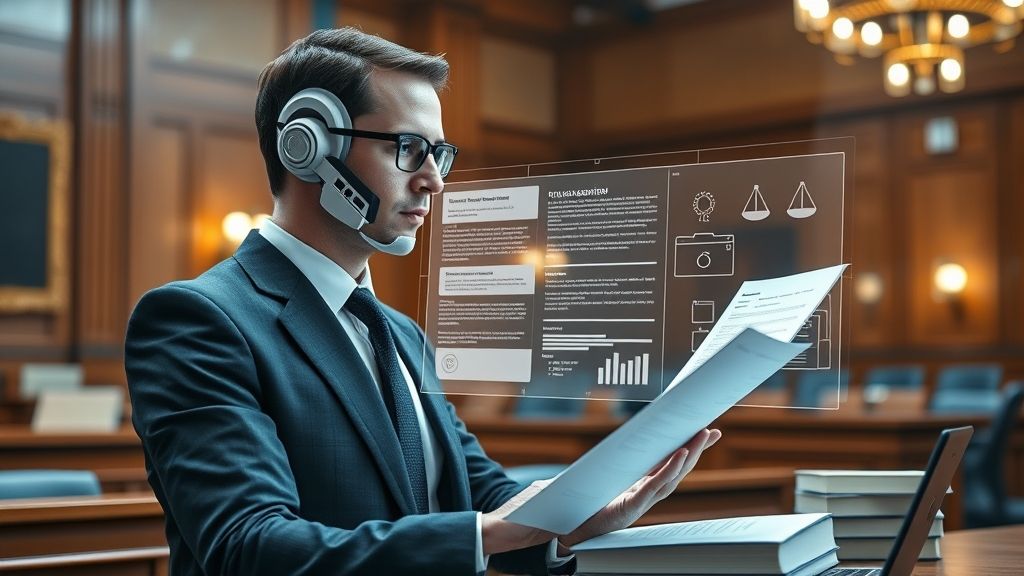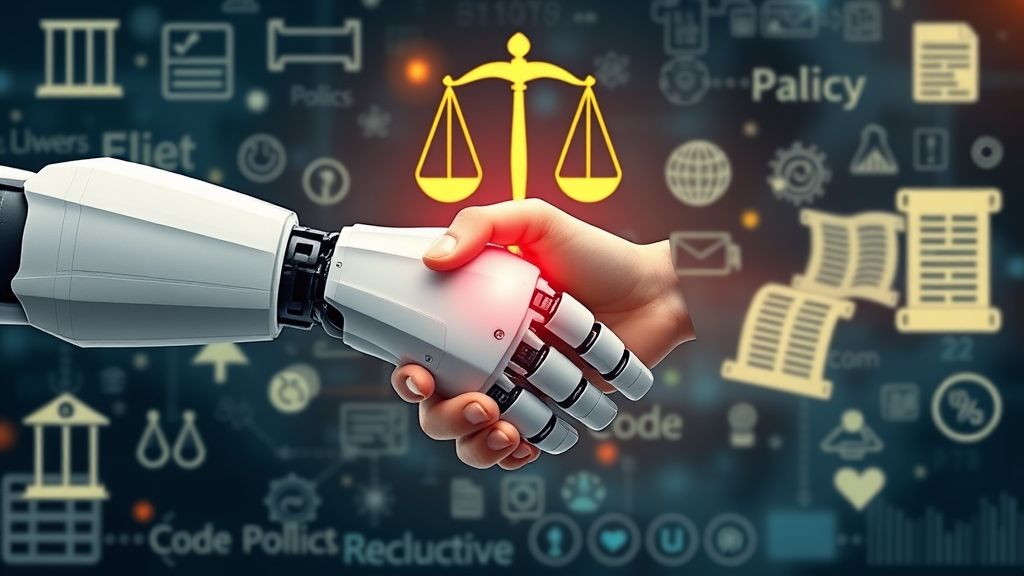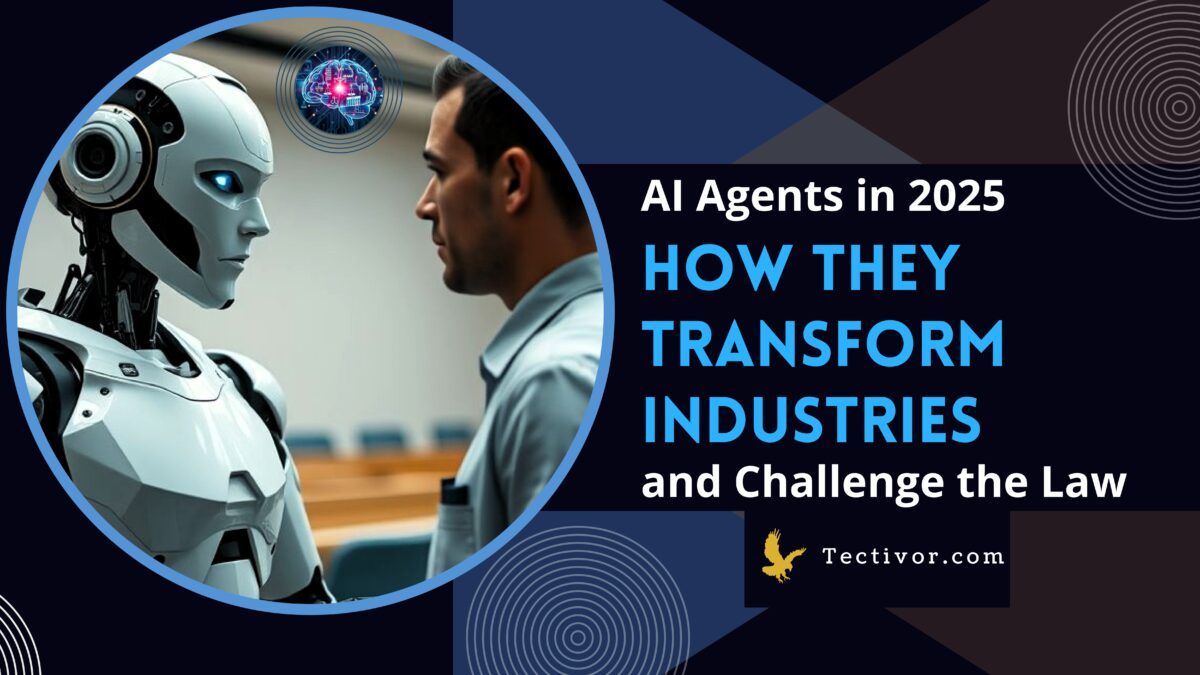Artificial Intelligence (AI) – AI agents in 2025 has steadily evolved from a back-office automation tool into a frontline decision-maker. In 2025, one of the most revolutionary developments within this space is the emergence of AI agents—autonomous systems capable of perceiving, reasoning, and acting in complex environments with minimal human oversight. These intelligent agents are no longer science fiction. They’re actively reshaping how industries operate and raising profound legal and ethical concerns that humanity must urgently address.
In this post, we’ll explore how AI agents in 2025 are transforming various industries, from healthcare to law, and dive deep into the legal uncertainties that come with their increasing autonomy.
Table of Contents
AI agents in 2025: What Are AI Agents?
An AI agent is a program or machine that perceives its environment through sensors, makes decisions using an intelligent reasoning system, and performs actions to achieve a specific goal. Unlike traditional software, AI agents are capable of autonomous learning and adaptation, allowing them to improve their performance without continuous human intervention.
Examples include:
- ChatGPT-based virtual legal consultants
- AI financial advisors
- Hospital nursebots
- Autonomous drones in logistics and agriculture
These agents can manage tasks ranging from answering customer inquiries to executing trades or even conducting legal research.
AI Agents in Key Industries
1. AI in Healthcare: AI-Powered Nursebots and Diagnostics
In Japan and increasingly elsewhere, AI-powered nurse robots like “Nurabot” are assisting with patient monitoring, medication reminders, and even mobility support. These robots reduce the burden on healthcare workers and can operate 24/7 without fatigue.
Additionally, AI agents are:
- Diagnosing diseases through pattern recognition in medical imaging
- Managing patient schedules
- Conducting preliminary consultations via chat interfaces
Impact: Increased efficiency and better allocation of human medical resources. However, the question remains: what happens when these systems fail to detect a symptom or misdiagnose?
2. Legal Industry: AI Lawyers and Case Assistants
AI is becoming the newest associate in the legal world. Tools like Harvey.ai, built on models like OpenAI’s GPT, are being deployed by global law firms to:
- Draft contracts
- Conduct legal research
- Predict case outcomes
In fact, some firms are now training AI agents on their private case data, creating bespoke legal assistants that can handle low-to-mid complexity cases at scale.

Impact: Law firms can serve more clients faster and at lower costs. But when an AI gives the wrong advice or omits a key precedent, the liability becomes murky.
3. Customer Service: Chatbots to Multimodal AI Agents
From airlines to banks, customer service has shifted from long human call queues to AI-powered chatbots and voice assistants. These systems can now:
- Understand natural language
- Handle escalations
- Resolve billing disputes
- Recommend solutions based on user behavior
Companies like Meta, Google, and Amazon are leading the way in training multimodal AI agents that can interpret voice, text, and visual input.
Impact: Cost savings and improved customer satisfaction. However, when an AI refuses a valid claim or leaks private data, the consumer has little recourse.
4. Finance: Robo-Advisors and Autonomous Trading Bots
In investment and banking, AI agents now perform:
- Portfolio management via robo-advisors
- Fraud detection
- Risk assessment
- Autonomous trading on crypto and stock platforms
These systems continuously learn from market behavior, making them powerful tools—but also potential disruptors in the case of error-induced flash crashes or biased decision-making.
The Legal challenges of AI and Ethical Minefield
As AI agents gain more independence, they blur the line between tool and actor. This introduces several unresolved legal and ethical questions:
1. Who Is Legally Responsible When AI Fails?
If an AI agent makes a medical error, gives incorrect legal advice, or causes a financial loss, who is at fault?
- The developer?
- The company that deployed it?
- The user who relied on it?
Current legal systems are built around human accountability, not autonomous systems. This gap is becoming more dangerous as AI takes on more critical roles.
2. Do AI Agents Have Legal Status?
In some jurisdictions, there are discussions around giving AI agents “electronic personhood” to hold them legally AI accountability or to manage intellectual property they generate (such as written content, art, or code).
However, this is controversial. Granting rights or responsibilities to non-living entities could lead to significant unintended consequences—like shielding human creators from liability.
3. Can AI Decisions Be Transparent and Fair?
AI agents often operate as black boxes—especially those powered by deep learning. This raises concerns:
- How can a person appeal a decision they don’t understand?
- Can a company audit the AI’s logic if it causes harm?
The EU’s AI Act and similar frameworks in the U.S. and India are starting to mandate explainability, but implementation is still at an early stage.
4. Bias, Discrimination, and Ethical Boundaries
AI agents trained on biased data can perpetuate or even amplify discrimination. This has been seen in:
- Loan approval systems
- Job recruitment tools
- Healthcare diagnosis systems
Ensuring fairness and inclusivity in autonomous AI systems decision-making is one of the hardest problems in AI ethics today.
What Governments and Regulators Are Doing
While laws haven’t kept pace with innovation, some progress is underway:
- European Union’s AI Act (2025): Classifies AI applications by risk level and sets rules for high-risk use cases.
- USA’s Algorithmic Accountability Act: Requires companies to assess their algorithms for bias and discrimination.
- India’s Digital Personal Data Protection Act (DPDPA): Offers limited regulation on automated processing, but more laws are expected.
Still, enforcement is limited, and most of the world operates in a legal gray area when it comes to AI agents.

How Businesses and Individuals Can Stay Ahead
For Businesses:
- Perform Risk Assessments: Before deploying AI agents in core processes.
- Implement AI Auditing Tools: To ensure transparency and ethical compliance.
- Create Human Oversight Protocols: Especially for high-impact decisions.
For Individuals:
- Learn the Tools: Understand how AI agents work in your industry.
- Understand Your Rights: Especially regarding data and AI-based decisions.
- Stay Informed: Follow global and local legal developments in AI governance.
Conclusion
AI agents in 2025 are no longer assistants—they’re operators. They’re diagnosing, advising, managing, and sometimes making decisions with real-world consequences. As their role deepens across industries, the legal and ethical systems governing them must catch up—fast.
Understanding this landscape is not just important for policymakers or tech developers. It’s critical for anyone whose job, health, or rights may one day depend on the judgment of an algorithm.
The era of autonomous agents is here. Whether it brings more empowerment or entanglement depends on how we prepare today.
💡 Stay ahead of the future! Follow us on:
Facebook | LinkedIn


